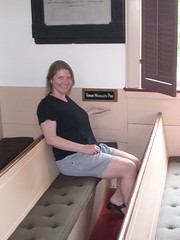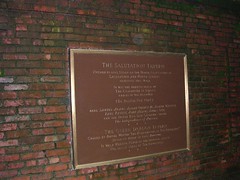The Elements of (Online) Style and Passion
Christina Wodtke had a nice article earlier this month on Boxes and Arrows, "Putting the White Back in Strunk and White."
Find anyone who has taught Composition over the last 40+ years, and I guarantee 99% can recite direct quotes from S&W. And it's not because Comp teachers are at their core pedantic rule-junkies. Ok, some are, but regardless of writing and teaching philosophies, we all find "rich deposits of gold" in Strunk's original and White's augmented Elements of Style. Who among us doesn't have "Omit needless words" or "Write with nouns and verbs" burned into her brain? Who doesn't feel an odd mix of comfort, determination, and joy when reading statements such as these:
"Vigorous writing is concise. A sentence should contain no unnecessary words, a paragraph no unnecessary sentences, for the same reason that a drawing should have no unnecessary lines and a machine no unnecessary parts."
"The adjective hasn't been built that can pull a weak or inaccurate noun out of a tight place."
"Rather, very, little, pretty--these are the leeches that infest the pond of the prose, sucking the blood of words."
I don't agree with everything Strunk and White declare, and I always pointed out inconsistencies to my students to remind them that even those who write rulebooks sometimes play fast and loose with the so-called rules. But it is one of only two books I keep more than 3 copies of, and which I keep at hand at all times. (The other is a certain novel about a whale.)
What I like about Wodtke's article isn't just the reminder to use Elements of Style to help guide Web design, I.A., and content (a given), but to view it as a guide to balancing, considering, and sometimes incorporating and sometimes discounting the passionate declarations of our peers regarding what is "right" and, more often, "wrong."
Wodtke writes, "As we read vigorous statements such as 'Flash is bad' or 'Don’t do testing; just ship and watch,' it’s easy to have a knee-jerk reaction. But stepping back from the initial emotional slap, we can see more than a petite dictator laying down the law. We can see an impassioned craftsman trying to share both his love of the trade and impart some of his hard earned learnings. Like White, can we begin to love and listen to all the Strunks out there, without becoming angry but instead synthesizing their knowledge with own perspective?...The real secret of E.B. White is listening, incorporating, translating, and finally accepting pundits into our practice. We aren't at war at all. We all want the same thing. We all want more great work in the world."
Find anyone who has taught Composition over the last 40+ years, and I guarantee 99% can recite direct quotes from S&W. And it's not because Comp teachers are at their core pedantic rule-junkies. Ok, some are, but regardless of writing and teaching philosophies, we all find "rich deposits of gold" in Strunk's original and White's augmented Elements of Style. Who among us doesn't have "Omit needless words" or "Write with nouns and verbs" burned into her brain? Who doesn't feel an odd mix of comfort, determination, and joy when reading statements such as these:
"Vigorous writing is concise. A sentence should contain no unnecessary words, a paragraph no unnecessary sentences, for the same reason that a drawing should have no unnecessary lines and a machine no unnecessary parts."
"The adjective hasn't been built that can pull a weak or inaccurate noun out of a tight place."
"Rather, very, little, pretty--these are the leeches that infest the pond of the prose, sucking the blood of words."
I don't agree with everything Strunk and White declare, and I always pointed out inconsistencies to my students to remind them that even those who write rulebooks sometimes play fast and loose with the so-called rules. But it is one of only two books I keep more than 3 copies of, and which I keep at hand at all times. (The other is a certain novel about a whale.)
What I like about Wodtke's article isn't just the reminder to use Elements of Style to help guide Web design, I.A., and content (a given), but to view it as a guide to balancing, considering, and sometimes incorporating and sometimes discounting the passionate declarations of our peers regarding what is "right" and, more often, "wrong."
Wodtke writes, "As we read vigorous statements such as 'Flash is bad' or 'Don’t do testing; just ship and watch,' it’s easy to have a knee-jerk reaction. But stepping back from the initial emotional slap, we can see more than a petite dictator laying down the law. We can see an impassioned craftsman trying to share both his love of the trade and impart some of his hard earned learnings. Like White, can we begin to love and listen to all the Strunks out there, without becoming angry but instead synthesizing their knowledge with own perspective?...The real secret of E.B. White is listening, incorporating, translating, and finally accepting pundits into our practice. We aren't at war at all. We all want the same thing. We all want more great work in the world."
 "If we do not lay out ourselves in the service of mankind whom should we serve?"
"If we do not lay out ourselves in the service of mankind whom should we serve?" A number of people have been a bit amazed that I went all the way to New Bedford and planned an entire vacation around my love of
A number of people have been a bit amazed that I went all the way to New Bedford and planned an entire vacation around my love of 
 At the JFK museum, much attention was paid to the Nixon/Kennedy debates and the roll television played in the campaign. Kennedy himself said, "It was television more than anything else that turned the tide."
At the JFK museum, much attention was paid to the Nixon/Kennedy debates and the roll television played in the campaign. Kennedy himself said, "It was television more than anything else that turned the tide." When you look at everything JFK accomplished or at least got off the ground in such a short time (civil rights, the peace corps, the space program, etc), you know that he wasn't acting alone. He had a lot of incredible people working with him. Great leaders don't accomplish everything themselves. They find smart people (or more likely they already know them), they inspire them to work toward common goals, and they let them fly.
When you look at everything JFK accomplished or at least got off the ground in such a short time (civil rights, the peace corps, the space program, etc), you know that he wasn't acting alone. He had a lot of incredible people working with him. Great leaders don't accomplish everything themselves. They find smart people (or more likely they already know them), they inspire them to work toward common goals, and they let them fly. This is a photo of a memorial in the Paul Revere mall, commemorating the Salutation Tavern and the Green Dragon Tavern--places where a lot of cool people with energy and brains hung out, drank beer, plotted revolution, and planned a country.
This is a photo of a memorial in the Paul Revere mall, commemorating the Salutation Tavern and the Green Dragon Tavern--places where a lot of cool people with energy and brains hung out, drank beer, plotted revolution, and planned a country. From the first chapter of Moby-Dick, "Whenever I find myself growing grim about the mouth; whenever it is a damp, drizzly November in my soul; whenever I find myself involuntarily pausing before coffin warehouses, and bringing up the rear of every funeral I meet; and especially whenever my hypos get such an upper hand of me, that it requires a strong moral principle to prevent me from deliberately stepping into the street, and methodically knocking people's hats off--then, I account it high time to get to sea as soon as I can."
From the first chapter of Moby-Dick, "Whenever I find myself growing grim about the mouth; whenever it is a damp, drizzly November in my soul; whenever I find myself involuntarily pausing before coffin warehouses, and bringing up the rear of every funeral I meet; and especially whenever my hypos get such an upper hand of me, that it requires a strong moral principle to prevent me from deliberately stepping into the street, and methodically knocking people's hats off--then, I account it high time to get to sea as soon as I can."
